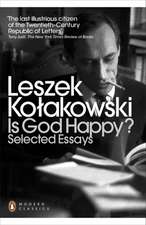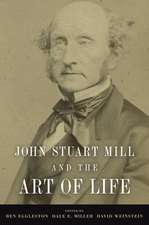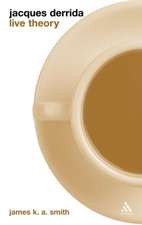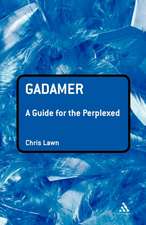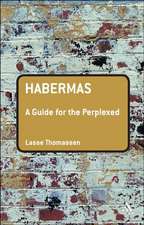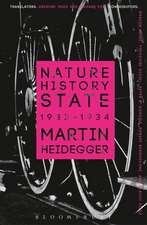Michael Oakeshott: Major Conservative and Libertarian Thinkers
Autor Dr. Edmund Neillen Limba Engleză Paperback – 13 mar 2013
| Toate formatele și edițiile | Preț | Express |
|---|---|---|
| Paperback (1) | 215.25 lei 6-8 săpt. | |
| Bloomsbury Publishing – 13 mar 2013 | 215.25 lei 6-8 săpt. | |
| Hardback (1) | 945.49 lei 6-8 săpt. | |
| Bloomsbury Publishing – 18 ian 2010 | 945.49 lei 6-8 săpt. |
Din seria Major Conservative and Libertarian Thinkers
- 22%
 Preț: 945.88 lei
Preț: 945.88 lei - 14%
 Preț: 183.70 lei
Preț: 183.70 lei -
 Preț: 331.80 lei
Preț: 331.80 lei -
 Preț: 215.25 lei
Preț: 215.25 lei - 13%
 Preț: 222.27 lei
Preț: 222.27 lei - 13%
 Preț: 222.27 lei
Preț: 222.27 lei - 13%
 Preț: 222.27 lei
Preț: 222.27 lei - 13%
 Preț: 221.83 lei
Preț: 221.83 lei -
 Preț: 183.70 lei
Preț: 183.70 lei -
 Preț: 183.24 lei
Preț: 183.24 lei - 24%
 Preț: 182.35 lei
Preț: 182.35 lei -
 Preț: 189.61 lei
Preț: 189.61 lei - 14%
 Preț: 183.24 lei
Preț: 183.24 lei - 14%
 Preț: 190.96 lei
Preț: 190.96 lei -
 Preț: 215.25 lei
Preț: 215.25 lei -
 Preț: 222.27 lei
Preț: 222.27 lei -
 Preț: 189.18 lei
Preț: 189.18 lei - 14%
 Preț: 189.18 lei
Preț: 189.18 lei
Preț: 215.25 lei
Nou
Puncte Express: 323
Preț estimativ în valută:
41.19€ • 42.85$ • 34.01£
41.19€ • 42.85$ • 34.01£
Carte tipărită la comandă
Livrare economică 14-28 aprilie
Preluare comenzi: 021 569.72.76
Specificații
ISBN-13: 9781441141323
ISBN-10: 1441141324
Pagini: 160
Dimensiuni: 140 x 213 x 13 mm
Greutate: 0.23 kg
Editura: Bloomsbury Publishing
Colecția Bloomsbury Academic
Seria Major Conservative and Libertarian Thinkers
Locul publicării:New York, United States
ISBN-10: 1441141324
Pagini: 160
Dimensiuni: 140 x 213 x 13 mm
Greutate: 0.23 kg
Editura: Bloomsbury Publishing
Colecția Bloomsbury Academic
Seria Major Conservative and Libertarian Thinkers
Locul publicării:New York, United States
Caracteristici
Michael Oakeshott is a key conservative thinker of the 20th century for his outstanding works on religion and political theory.
Notă biografică
Edmund Neill is a Lecturer at St. Peter's College, University of Oxford, UK.
Cuprins
1. Michael Oakeshott's Life \ 2. Michael Oakeshott as Defender of Pluralism and Moderni \ 3. The Reception of Michael Oakeshott's Thought \ 4. Oakeshott's Continuing Relevance: Some Meditations on Conservatism and Liberalism \ Bibliography \ Index
Recenzii
"The volumes in this timely series comprise the most comprehensive body of material on conservative and libertarian thought yet published in a single project devoted to the subject. The series will prove an indispensable tool not only for those concerned with the history of political thought but also for those who confront the challenging task of constructing a viable contemporary conservative identity. Professor Meadowcroft had a difficult editorial task, to which he has responded with a judicious choice of thinkers and topics." Noel O'Sullivan, Professor of Political Philosophy, the University of Hull, UK.
"In this learned and lucid volume Edmund Neill not only provides an invaluable introduction to Oakeshott's work, but also situates it within the wider history of thought. It will be of use to those new to Oakeshott, and will stimulate debate amongst those already familiar with his writings. Neill's Oakeshott is more coherent and more conservative than others have argued. He is also more interesting." --William Whyte, Fellow and University Lecturer in History, St John's College, Oxford
"In contrast to contemporaries such as Friedrich Hayek, Karl Popper and Isaiah Berlin, whose main political ideas are easy to understand and presented in very clear prose, Michael Oakeshott is a difficult thinker, and one whose major writings from the 1930s to the 1980s demand and deserve the kind of patient and careful reading they are, with the passage of time, increasingly unlikely to receive. The great merit of Edmund Neill's fine new book is that it provides a fair-minded overview of Oakeshott's long intellectual career, one that illuminates the various contexts in which he wrote and that makes his arguments accessible to today's readers without pernicious oversimplification, while also developing a distinctive and persuasive interpretation of his overall political project as one built around a defence of a modern, pluralist individualism." --Dr. Christopher Brooke, Fellow, King's College, Cambridge, and Lecturer, University of Cambridge Department of Politics and International Studies
"Michael Oakeshott once wrote that though people often say life's the thing, he preferred conversation. Absolute dogmatism and absolute omniscience destroyed good conversation and what he was later to call 'ambulatory conversation' was always to be favoured over reasoning 'as the crow flies'. If this preference appears to confirm what critics call either Oakeshott's elusiveness or even his dandyism, it is an image appropriate to the enduring concerns of his thought - the dangers of rationalism in politics, of moral perfectionism, of singleness of purpose, of a purely instrumental conception of public life. In this concise study, Edmund Neill argues convincingly for reading Oakeshott as a thinker who was not concerned to defend tradition against modernity as if frequently believed. Rather he was concerned to defend the modern, multi-voiced, inheritance of liberty and diversity against those other, univocal, tendencies of modernity which threatened and continue to threaten it. Neill provides a critical digest of Oakeshott's major published work and how it stood in relation to the work of his scholarly contemporaries. The book concludes with some reflections on where Oakeshott might be placed on an ideological map, perhaps a conservative in politics if only because he appreciated so much the conventional nature of individuality. However, the great virtue of Neill's account is that it will encourage readers to engage in their own conversation with Oakeshott and encounter, again or for the first time, a congenial intellectual companion." --Arthur Aughey, Professor of Politics, University of Ulster
"Michael Oakeshott is one of the hardest of political philosophers to encapsulate in a short book of around 120 pages, for he sought to propound no system and belonged to no identifiable movement of thought. In this book Edmund Neill performs a major service to the study of Oakeshott's thought by providing an accessible and readable survey which at the same time provides an original and skilfully argued line of interpretation. Neill is clear that Oakeshott must be considered a conservative, and in his final chapter he displays a rich understanding of the history of political thought to defend this interpretation against those who have emphasized Oakeshott's liberalism. Conservatism, as an articulate political theory rather than an unspoken set of assumptions, originated in a revolt against 'modernity' in its various dimensions (political, economic, intellectual). Those who know Oakeshott only through his best-known essay, 'Rationalism in Politics', might easily place him in this same lineage. Neill shows, I think convincingly, that a careful study of Oakeshott's mature thought makes this interpretation untenable. His was a conservatism that embraced modernity rather than revolting against it. Whereas many conservatives have mourned the loss of an organic 'traditional society', Oakeshott celebrated the freedom generated by the rise of modern individualism and pluralism. He deplored political rationalism because its was a false modernity which threatened to undermine 'the character of the modern European state', to use the title of one of his most important later works. This is a book which tutors will be able to place in their students' hands with confidence; but it should also make specialists want to go back and re-read Oakeshott afresh. That is a great achievement for a book of this size." --Stuart Jones, Professor of Intellectual History, University of Manchester
"A masterfully concise account of the entire range of Oakeshott's writing. In contrast to those commentators who treat him as an isolated figure, Edmund Neill helpfully locates Oakeshott in the context of twentieth century political thought. He is also persuasive in arguing that Oakeshott should be viewed not as a liberal but as articulating a distinctive form of conservatism. This book provides both a nuanced discussion of Oakeshott's ideas and demonstrates their continuing relevance to political thought." - Michael Bacon, Lecturer in Political Theory, Department of Politics and International Relations, Royal Holloway, University of London
"A succinct, balanced and therefore valuable account of the major elements of Oakeshott's thinking...Neill always offers a sober understanding of Oakeshott's sometimes rather difficult teaching. He thus enables the reader to see what is Oakeshott's contribution to 20th century political and philosophical thought. As there are some more volumes of unpublished writings by Michael Oakeshott, it is to be expected that there will be other attempts to offer comprehensive interpretations of Oakeshott's ideas. Meanwhile, books like Neill's help to keep Oakeshott part of the "conversation of mankind." - Informationsmittel (IFB) [Information Resources for Libraries]
"Neill presents the life and ideas of British conservative political theorist Michael Oakeshott (1901-1990). He outlines Oakeshott's career, including his academic work and published and unpublished writings, then discusses how his ideas evolved over the course of the twentieth century, and his influence in the fields of the history of ideas, the philosophy of history, and political philosophy. He examines the difficulty in unifying Oakeshott's ideas; those about the rise of individualism in Western Europe, modernity and postmodernity, Enlightenment rationalism, and theorizing about practices; and his works Experience and Its Modes, Rationalism in Politics, On Human Conduct, and On History, in addition to his reception and continuing relevance." -Eithne O'Leyne, BOOK NEWS, Inc.
Mentioned.
"In this learned and lucid volume Edmund Neill not only provides an invaluable introduction to Oakeshott's work, but also situates it within the wider history of thought. It will be of use to those new to Oakeshott, and will stimulate debate amongst those already familiar with his writings. Neill's Oakeshott is more coherent and more conservative than others have argued. He is also more interesting." --William Whyte, Fellow and University Lecturer in History, St John's College, Oxford
"In contrast to contemporaries such as Friedrich Hayek, Karl Popper and Isaiah Berlin, whose main political ideas are easy to understand and presented in very clear prose, Michael Oakeshott is a difficult thinker, and one whose major writings from the 1930s to the 1980s demand and deserve the kind of patient and careful reading they are, with the passage of time, increasingly unlikely to receive. The great merit of Edmund Neill's fine new book is that it provides a fair-minded overview of Oakeshott's long intellectual career, one that illuminates the various contexts in which he wrote and that makes his arguments accessible to today's readers without pernicious oversimplification, while also developing a distinctive and persuasive interpretation of his overall political project as one built around a defence of a modern, pluralist individualism." --Dr. Christopher Brooke, Fellow, King's College, Cambridge, and Lecturer, University of Cambridge Department of Politics and International Studies
"Michael Oakeshott once wrote that though people often say life's the thing, he preferred conversation. Absolute dogmatism and absolute omniscience destroyed good conversation and what he was later to call 'ambulatory conversation' was always to be favoured over reasoning 'as the crow flies'. If this preference appears to confirm what critics call either Oakeshott's elusiveness or even his dandyism, it is an image appropriate to the enduring concerns of his thought - the dangers of rationalism in politics, of moral perfectionism, of singleness of purpose, of a purely instrumental conception of public life. In this concise study, Edmund Neill argues convincingly for reading Oakeshott as a thinker who was not concerned to defend tradition against modernity as if frequently believed. Rather he was concerned to defend the modern, multi-voiced, inheritance of liberty and diversity against those other, univocal, tendencies of modernity which threatened and continue to threaten it. Neill provides a critical digest of Oakeshott's major published work and how it stood in relation to the work of his scholarly contemporaries. The book concludes with some reflections on where Oakeshott might be placed on an ideological map, perhaps a conservative in politics if only because he appreciated so much the conventional nature of individuality. However, the great virtue of Neill's account is that it will encourage readers to engage in their own conversation with Oakeshott and encounter, again or for the first time, a congenial intellectual companion." --Arthur Aughey, Professor of Politics, University of Ulster
"Michael Oakeshott is one of the hardest of political philosophers to encapsulate in a short book of around 120 pages, for he sought to propound no system and belonged to no identifiable movement of thought. In this book Edmund Neill performs a major service to the study of Oakeshott's thought by providing an accessible and readable survey which at the same time provides an original and skilfully argued line of interpretation. Neill is clear that Oakeshott must be considered a conservative, and in his final chapter he displays a rich understanding of the history of political thought to defend this interpretation against those who have emphasized Oakeshott's liberalism. Conservatism, as an articulate political theory rather than an unspoken set of assumptions, originated in a revolt against 'modernity' in its various dimensions (political, economic, intellectual). Those who know Oakeshott only through his best-known essay, 'Rationalism in Politics', might easily place him in this same lineage. Neill shows, I think convincingly, that a careful study of Oakeshott's mature thought makes this interpretation untenable. His was a conservatism that embraced modernity rather than revolting against it. Whereas many conservatives have mourned the loss of an organic 'traditional society', Oakeshott celebrated the freedom generated by the rise of modern individualism and pluralism. He deplored political rationalism because its was a false modernity which threatened to undermine 'the character of the modern European state', to use the title of one of his most important later works. This is a book which tutors will be able to place in their students' hands with confidence; but it should also make specialists want to go back and re-read Oakeshott afresh. That is a great achievement for a book of this size." --Stuart Jones, Professor of Intellectual History, University of Manchester
"A masterfully concise account of the entire range of Oakeshott's writing. In contrast to those commentators who treat him as an isolated figure, Edmund Neill helpfully locates Oakeshott in the context of twentieth century political thought. He is also persuasive in arguing that Oakeshott should be viewed not as a liberal but as articulating a distinctive form of conservatism. This book provides both a nuanced discussion of Oakeshott's ideas and demonstrates their continuing relevance to political thought." - Michael Bacon, Lecturer in Political Theory, Department of Politics and International Relations, Royal Holloway, University of London
"A succinct, balanced and therefore valuable account of the major elements of Oakeshott's thinking...Neill always offers a sober understanding of Oakeshott's sometimes rather difficult teaching. He thus enables the reader to see what is Oakeshott's contribution to 20th century political and philosophical thought. As there are some more volumes of unpublished writings by Michael Oakeshott, it is to be expected that there will be other attempts to offer comprehensive interpretations of Oakeshott's ideas. Meanwhile, books like Neill's help to keep Oakeshott part of the "conversation of mankind." - Informationsmittel (IFB) [Information Resources for Libraries]
"Neill presents the life and ideas of British conservative political theorist Michael Oakeshott (1901-1990). He outlines Oakeshott's career, including his academic work and published and unpublished writings, then discusses how his ideas evolved over the course of the twentieth century, and his influence in the fields of the history of ideas, the philosophy of history, and political philosophy. He examines the difficulty in unifying Oakeshott's ideas; those about the rise of individualism in Western Europe, modernity and postmodernity, Enlightenment rationalism, and theorizing about practices; and his works Experience and Its Modes, Rationalism in Politics, On Human Conduct, and On History, in addition to his reception and continuing relevance." -Eithne O'Leyne, BOOK NEWS, Inc.
Mentioned.

